By J. Raymond
It’s not quite eight o’clock in the morning as I write these words upon a barf bag, thirty-something thousand feet up in the sky. Heading home (West Palm Beach) from my most recent book reading and signing in Boston. I drink a can of bloody Mary mix with two vodkas, reflecting on the events of the weekend. It was a success, I’d say. The room was full, books were purchased, alcohol was consumed, relationships consummated – all in all, a good weekend for a full-time writer.
The exception might be waking to a message from a lovely Bohemian woman hosting me for the weekend, informing me that all of my belongings were packed and waiting for me outside of her front door.
Using thumb and forefinger, I rub sleep from my eyes and attempt to shake some sort of awareness and consciousness into my frontal lobe. That remaining responsible part of my brain, which seems incessant on beating its way out of the front, back and sides of my skull at the moment.
Wait….where the hell am I?
Ah, I am not at previously mentioned Bohemian woman’s house. That is not good. I see many unanswered messages from her wondering if I am safe, if I will be back soon, if I am alive. I place my phone down, and realize then that a woman not Bohemian is asleep to my right. She stirs and her foot brushes mine. Yes, this was a successful weekend indeed.
Shortly after waking up, I’m retrieving my packed luggage, texting my only slightly sincerest apologies to my host, thanking her for her kind hospitality, and am off finding a hotel nearest to Logan airport for my one remaining night in Boston.
Once checked in and showered, I confirm all of my belongings were indeed packed – they were, and then it hits me….the one additional thing I intended to accomplish on this trip was to write my two-thousand word piece on William Butler Yeats (1865-1939). And my copy of The Best Poems of the English Language is in the back seat of said Bohemian woman’s Jeep.
There is always the internet of course, but there is just something about reading the greats from a beat up paperback that just feels right, it just makes more sense.
I shamefully conduct an internet search, typing in “W.B. Yeats Poetry”, and stop myself.
Now, with a more functional frontal lobe and less of a hangover and headache, I pull from the memory bank one of my favorite stanzas from Yeats, written in Adam’s Curse:
Better go down upon your marrow-bones
And scrub a kitchen pavement, or break stones
Like an old pauper, in all kinds of weather;
For to articulate sweet sounds together
Is to work harder than all these, and yet
Be thought an idler by the noisy set
Of bankers, schoolmasters, clergymen
The martyrs call the world.
See, for me, even putting pen to paper – let alone upon a barf bag in the coach section of an airline I can best describe as “economical”, and more accurately describe as “total shit” – about Wlliam Butler Yeats’ genius, feels like a complete injustice to his art.
He was arguably the most influential poet of his time. His art, unlike much of the vapid contemporary style of poetry that I, myself, tend to write, endures. It is not going anywhere. The millennials likely will never conduct a Google search looking for poems by Yeats, and that, unquestionably, is a disservice to any lover of poetry.
Once landing in West Palm Beach, I head to the nearest book store and find the same book that is still likely rolling around the back seat of a Jeep somewhere in New England. There was a particular prose that had escaped me, which, like most of his writings, I felt was worth sharing:
He only can create the greatest imaginable beauty who has
endured all imaginable pangs, for only when we have seen and
foreseen what we dread shall we be rewarded by that dazzling,
unforeseen, wing-footed wanderer. We could not find him if he
were not in some sense of our being, and yet of our own being but
as water with fire, a noise with silence. He is of all things not
impossible the most difficult, for that which comes easily can
never be a portion of our being; soon got, soon gone, as the
proverb says. I shall find the dark grown luminous, the void fruitful
when I understand I have nothing, that the ringers in the tower
have appointed for the hymen of the soul a passing bell.
Normally, in a piece highlighting an artist who has long since left this world, one is inclined to touch on the little nuances.
For example, his date and place of birth (June, 13th 1865 and Ireland), or what some of his most famous works are (The Tower, The Winding Stair and Other Poems, The Wild Swans at Coole), however, that is what Wikipedia is for. Read his work.
I would like to tell you a bit about the man, as I see him.
Aside from cementing himself for all of eternity as one of the greatest literary minds ever, I was quite pleased to learn that in 1917, ninety-nine years previous to me writing this, at the age of 52, he married Bertha George Hydelees – who was all of twenty-five.
Age, apparently, has always just been a number.
I certainly don’t want to juvenilize or diminish this man’s greatness, so aside from “robbing the cradle”, I will highlight some more significant (and mature) facts, along with some of his work that resonated most with me.
Yeats studied poetry from an early age, focusing mostly in the areas of Irish legend and occultism –
writing of the unknowns, astrology, spiritualism, etc. Shown here in a popular piece titled:
The Lake Isle of Innesfree
I will arise and go now, and go to Innisfree,
And a small cabin build there, of clay and wattles made;
Nine bean-rows will I have there, a hive for the honey-bee,
And live along in the bee-loud glade.
And I shall have some peace there, for peace comes dropping slow,
Dropping from the veils of the morning to where the cricket sings;
There midnight’s all a glimmer, and a noon a purple glow,
And evening full of the linnet’s wings.
I will arise and go now, for always night and day
I hear lake water lapping with low sounds by the shore;
While I stand on the roadway, or on the pavements grey,
I hear it in the deep heart’s core.
As is the case with many great writers, his work continued to evolve over the course of his life. In December of 1923 Yeats was awarded the Nobel Prize in Literature, an award he would use to help promote Irish Nationalism and cultural independence. With this new found publicity, Yeats was able to, for the first time in his life, pay off all personal and family debts.
Let me pause here for a polite rant on what I find to be the difference between classic poetry of yesteryear and the more contemporary poetry of today. I will not proclaim one to by more righteous than the other, only that when we look back and study the classics, it is quite apparent the effort poured into each collection of works.
I won’t go so far to say that many of the poetry of today has become lazy, but I will say that it seems to have become an art form now mostly expressed with much less attention to detail.
For example, in his book The Wanderings of Oisin, the poem is broken down and written in three separate parts. Each verse and stanza growing more complex as you go:
Book I:
You who are bent, and bald, and blind,
With a heavy heart and a wandering mind,
Have known three centuries, poets sing,
Of dalliance with a demon thing.
Book II:
Now, man of the croziers, shadows called our names
And then away, away, like whirling flames;
And now fled by, mist-covered, without sound,
The youth and lady and the deer and hound
Book III:
Fled foam underneath us, and round us, a wandering and milky smoke,
High as the saddle-girth, covering away from our glances the tide;
And those that fled, and that followed, from the foam-pale distance broke;
The immortal desire of Immortals we saw in their faces, and sighed.
From just the beginnings of each verse of the book, you can see the evolution of his writing. From a metrical length of four (iambic tetrameter), then to five (iambic pentameter), and finally six (anapaestic hexameter).
A nuance vital to this collection that reminded the world once more why Yeats was unlike any writer before, or to come. He stood and stands alone, to this day, and his impact of the literary world is still evident in those who hold poetry in high regard.
I likely will never write anything as profound as Yates, and reading his work always seems to excite and humble me, in equal parts. His effortless stringing together of verses to paint the most vivid of imagery, at times, takes me away – as great writing should. I recall a shorter piece of his titled A Drinking Song:
WINE comes in at the mouth
And love comes in at the eye;
That’s all we shall know for truth
Before we grow old and die
I lift the glass to my mouth,
I look at you, and I sigh.
It’s powerful even in its brevity, and the words delicate yet absolute. The picture painted, the message never goes unfelt, and you, for a second, smell and taste the wine – you, almost subconsciously, sigh alongside him.
Towards the end of his life, Yates, now 69 years of old was artistically and romantically rejuvenated by undergoing a Steinach operation. The new found enthusiasm was evident in his writing, and sexual affairs. Not a year later, in a letter he made mention of this second coming, so to speak –
“I find my present weakness made worse by the strange second puberty the operation has given me, the ferment that has come upon my imagination. If I write poetry it will be unlike anything I have done.”
William Butler Yates continued to produce work that would endure, up until his death on January, 28th 1939, in Menton, France. His funeral was modest and private, in Roquebrune-Cap-Martin in France, and one of the last wishes he made, according to the son of a former ex-wife, in charge of making final arrangements was:
“If I die bury me up there [at Roquebrune] and then in a year’s time when the newspapers have forgotten me, dig me up and plant me in Sligo.’”
His body was moved to County Sligo, Ireland in 1948, nine years later after his passing.
I started writing of William Butler Yates on both sides of a white barf bag while flying home, hungover, knowing damn well there would never be any chance of me doing him justice. Maybe that is the best way to describe him – indescribable.
His work is meant to be experienced, felt, absorbed. Reflect on what I feel is the golden age of poetry and literature. Whatever we write now we would like to believe is the evolution of poetry. I will always read Yates and feel more a sense of de-evolution. Ever that equal mix of excitement and humility, while reading his work, and my hope now is that more people look back to what once was, starting with that lovely Bohemian woman driving her black Jeep around New England, with perhaps the greatest writer of all-time rolling around behind her seat.
—
J. Raymond is a father, thinker and author of Spades & Let Her Run. Connect with him on Instagram, Pinterest and find signed works at: www.etsy.com/shop/jraymondwriting
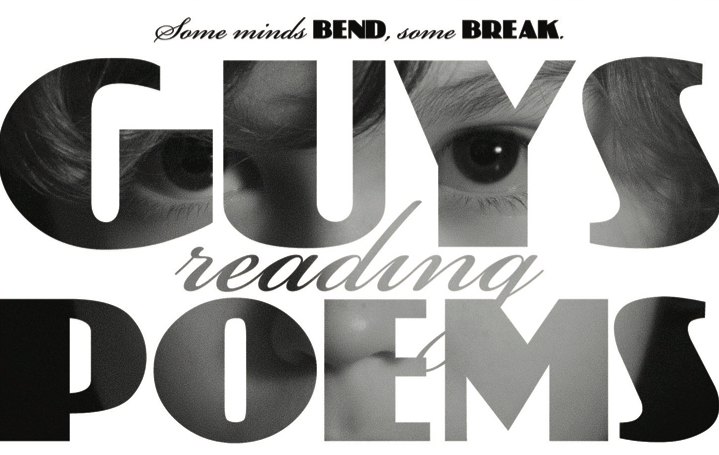
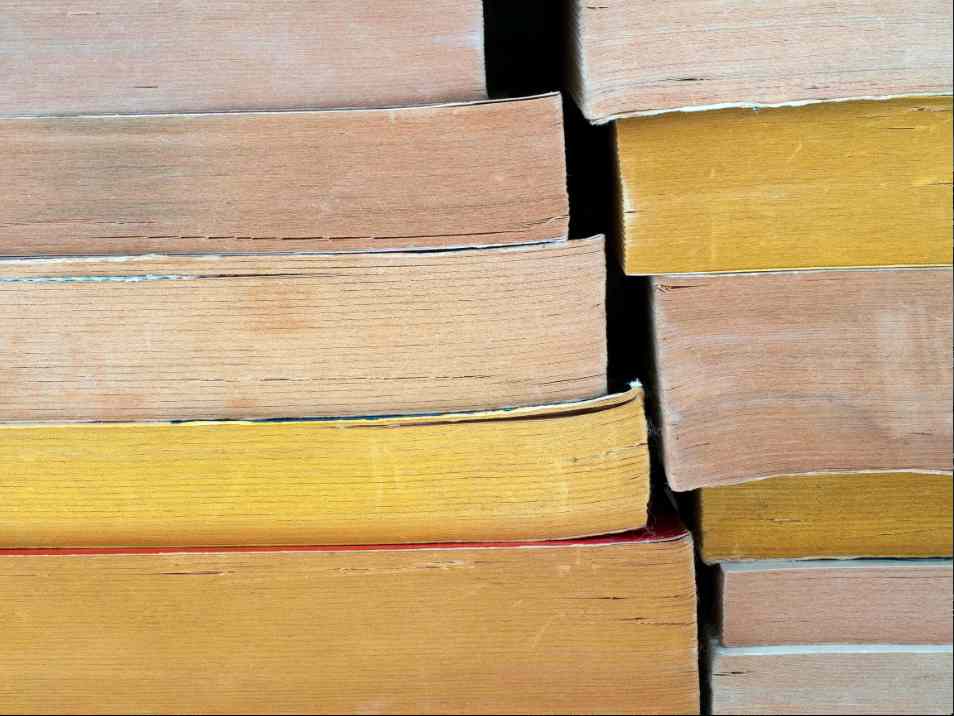
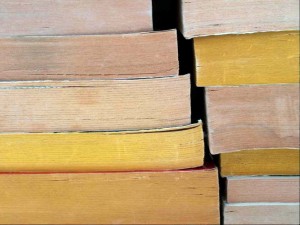
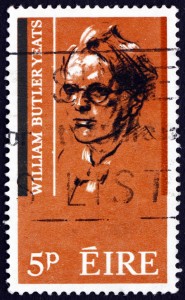
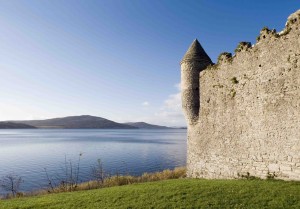
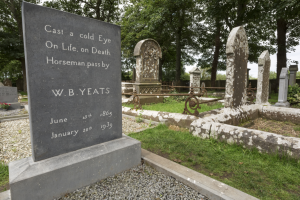
The day of his death was a dark cold day.